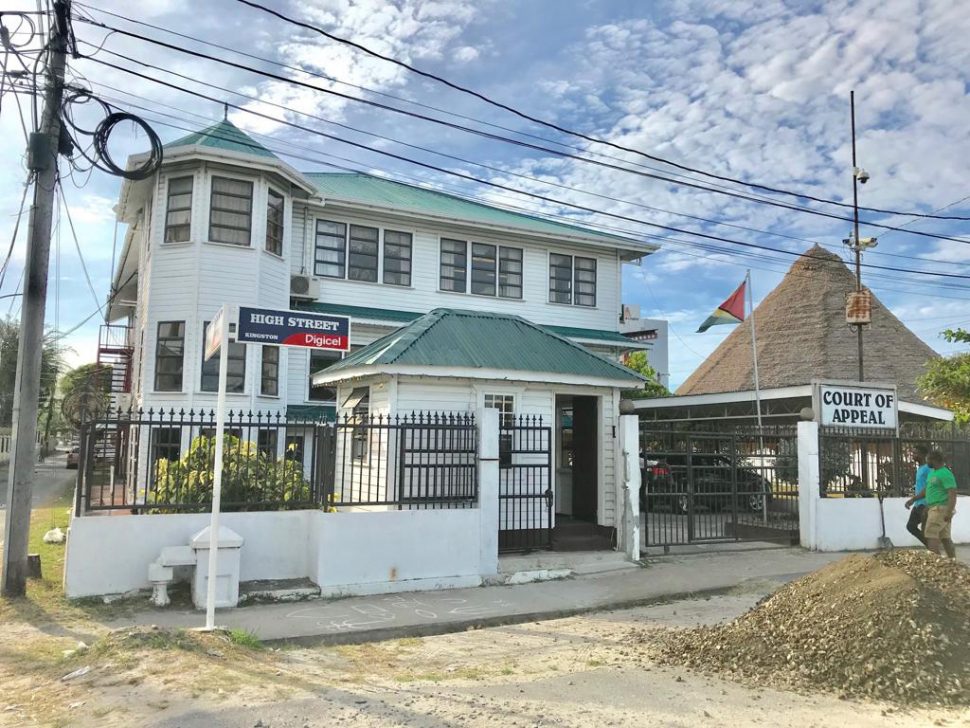The Court of Appeal application filed yesterday to prevent the Chief Election Officer (CEO) from submitting a report to enable a final declaration from the March 2 polls is contending that the Guyana Elections Com-mission (GECOM) deviated from the order that guided the national vote recount and failed to determine “final credible” results.
A hearing of the application, which was used to justify Chief Election Officer Keith Lowenfield’s failure to submit the report that was due yesterday, has been set for 1.30 this afternoon before the Guyana Court of Appeal.
Through her attorney Mayo Robertson, the applicant, Sophia resident Eslyn David, is arguing that the results of the votes cast in the elections were not credible and therefore the CEO should not present any final report.
David has mounted her challenge before the appellate court pursuant to Article 177 (4) of the Constitution, which says that that court shall have exclusive jurisdiction to hear and determine any question as to the validity of an election of a President in so far as that question depends upon the qualification of any person for election or the interpretation of the Constitution, and any decision of that Court.
Chairperson of GECOM retired Justice Claudette Singh on Tuesday had instructed Lowenfield to submit his final report in accordance with results from the national recount, which showed a victory for the opposition PPP/C.
However, while Lowenfield’s initial report on the recount process acknowledged the certified results, it also cited alleged anomalies uncovered during the process and as a result concluded that the results did not reflect a fair and credible election. Critics have argued that Lowenfield has no authority to pronounce on the validity of the votes and Singh has also said that it is the High Court and not GECOM which has the authority to determine the validity of the elections.
It is against this background that David wants the appellate court to declare that GECOM has failed to determine a final credible count and or the credibility of the result of the elections and on this ground is seeking several orders.
She wants the court to grant an order restraining the CEO from complying with the Chairperson’s direction and prohibiting GECOM from determining the final credible count and or the credibility of the elections.
She also wants the court to grant orders restraining the CEO from submitting the elections report to GECOM, which she is contending contains votes which are not credible.
The tabulation of the recounted ballots, which concluded last week Monday, saw the opposition People’s Progressive Party/ Civic (PPP/C) leading the incumbent A Partnership for National Unity + Alliance for Change (APNU+AFC) by 15,416 votes—with the PPP/C securing 233,336 votes compared with 217,920 secured by APNU+AFC.
In the affidavit supporting her motion, David described herself as a keen follower of politics and civic affairs and said that having voted at the March 2nd polls, she was anxiously awaiting the results of the elections.
She said she expected that within a few days after the elections there would have been a public announcement of the results and she would know who was elected President and members of the National Assembly.
David’s major contention is that the Commission deviated from its recount order, which guided the recount process that was to determine a “final credible count” to make the declaration of the results.
She argues, however, that votes which lacked credibility were allowed by the Commission to be tabulated and included in the final count. Those votes, she argues, cannot be regarded as credible and should not have been included.
She submits that in accordance with the recount order and pursuant to Section 96 (1) of the Representation of the People Act, the Chief Election Officer is required to determine the “total number of “valid votes” and in accordance with Article 177 (2) (b) of the Constitution where there is the reference to “more votes cast” it must necessarily mean more “valid votes” cast.
David pointed out that during the recount, APNU+AFC election agent Joe Harmon had written the Commission and complained of what she said were numerous discrepancies and anomalies which impacted on the credibility of the elections.
David said that the Commission has confirmed that the credibility of elections was a critical component of the national recount. She argues that despite this confirmation, the Commission later stated it did not have the legal authority to determine the credibility of the elections and by extension to arrive at a final credible count as required by the recount orders.









